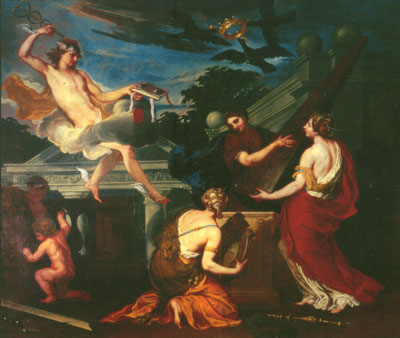
If the Sun is central at Eggenberg, as symbolic of a youthful, rising dynasty, notable for its generosity and steadfastness, HERMES, or Mercury, is central to Sentence of the Gods, its god a surrogate for the author who communicates with most of the other gods above and below him and the two with whom he shares a book. The Eggenberg Mercury is represented in a very specific posture delivering “the Letters Patent granting nobility to the family. Mercury,” Kaiser explains, “messenger of the gods, descends to earth to hand over the scroll. Three allegorical female figures are erecting an obelisk showing the Eggenberg coat of arms. Cherubs are still working with their chisels on a cartouche.” She points out that Hermes, the son of Zeus by the nymph Maia, was born secretly in the dark of night.
For the Eggenbergs it was enough that Mercury be regarded as a traditional tutelary god of merchants and diplomats. For MM and Sentence of the Gods Hermes is much more. HERMES, the sequence, interweaves with primary texts a whole variety of secondary wisdom texts, from Homer, the Bible, the Egyptian and Neo-Platonic traditions, from the Hindu, Chinese and Angkorean traditions, and from Hesiod. Thus MM’s Hermes, though he communicates between heaven and earth and is also a god of eloquence, is preeminently a god of wisdom, which he creates as well as transcribes, interprets and transmits. The Eggenberg Mercury bears a simple, pragmatic text; the Morrisonian Hermes revives, edits, interweaves and adjudicates the claims of difficult, diverse, encyclopedic traditions.
Nonetheless, as a traveler, MM also solicits protection from this swift, attentive god.